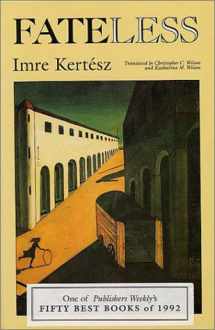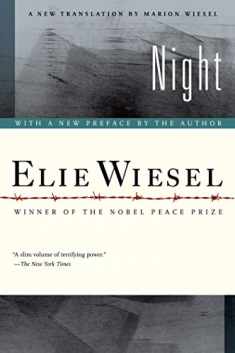
Fateless
ISBN-13:
9780810110496
ISBN-10:
0810110490
Author:
Christopher Wilson, Katharina Wilson, Imre Kertész
Publication date:
1996
Publisher:
Northwestern University Press
Format:
Paperback
191 pages
FREE US shipping
Book details
ISBN-13:
9780810110496
ISBN-10:
0810110490
Author:
Christopher Wilson, Katharina Wilson, Imre Kertész
Publication date:
1996
Publisher:
Northwestern University Press
Format:
Paperback
191 pages
Summary
Fateless (ISBN-13: 9780810110496 and ISBN-10: 0810110490), written by authors
Christopher Wilson, Katharina Wilson, Imre Kertész, was published by Northwestern University Press in 1996.
With an overall rating of 4.3 stars, it's a notable title among other
books. You can easily purchase or rent Fateless (Paperback) from BooksRun,
along with many other new and used
books
and textbooks.
And, if you're looking to sell your copy, our current buyback offer is $0.37.
Description
Winner, 2002 Nobel Prize for Literature
One of Publishers Weekly's Fifty Best Books of 1992
Fateless is a moving and disturbing novel about a Hungarian Jewish boy’s experiences in German concentration camps and his attempts to reconcile himself to those experiences after the war. Upon his return to his native Budapest still clad in his striped prison clothes, fourteen-year-old George Koves senses the indifference, even hostility, of people on the street. His former neighbors and friends urge him to put the ordeal out of his mind, while a sympathetic journalist refers to the camps as "the lowest circle of hell." The boy can relate to neither cliche and is left to ponder the meaning of his experience alone.
George's response to his experience is curiously ambivalent. In the camps he tries to adjust to his ever-worsening situation by imputing human motives to his inhumane captors. By imposing his logic--that of a bright, sensitive, though in many ways ordinary teenager - he maintains a precarious semblance of normalcy. Once freed, he must contend with the "banality of evil" to which he has become accustomed: when asked why he uses words like "naturally," "undeniably," and "without question" to describe the most horrendous of experiences, he responds, "In the concentration camp it was natural." Without emotional or spiritual ties to his Jewish heritage and rejected by his country, he ultimately comes to the conclusion that neither his Hungarianness nor his Jewishness was really at the heart of his fate: rather, there are only "given situations, and within these, further givens."
One of Publishers Weekly's Fifty Best Books of 1992
Fateless is a moving and disturbing novel about a Hungarian Jewish boy’s experiences in German concentration camps and his attempts to reconcile himself to those experiences after the war. Upon his return to his native Budapest still clad in his striped prison clothes, fourteen-year-old George Koves senses the indifference, even hostility, of people on the street. His former neighbors and friends urge him to put the ordeal out of his mind, while a sympathetic journalist refers to the camps as "the lowest circle of hell." The boy can relate to neither cliche and is left to ponder the meaning of his experience alone.
George's response to his experience is curiously ambivalent. In the camps he tries to adjust to his ever-worsening situation by imputing human motives to his inhumane captors. By imposing his logic--that of a bright, sensitive, though in many ways ordinary teenager - he maintains a precarious semblance of normalcy. Once freed, he must contend with the "banality of evil" to which he has become accustomed: when asked why he uses words like "naturally," "undeniably," and "without question" to describe the most horrendous of experiences, he responds, "In the concentration camp it was natural." Without emotional or spiritual ties to his Jewish heritage and rejected by his country, he ultimately comes to the conclusion that neither his Hungarianness nor his Jewishness was really at the heart of his fate: rather, there are only "given situations, and within these, further givens."


We would LOVE it if you could help us and other readers by reviewing the book
Book review

Congratulations! We have received your book review.
{user}
{createdAt}
by {truncated_author}




